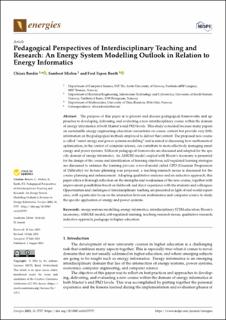| dc.contributor.author | Bordin, Chiara | |
| dc.contributor.author | Mishra, Sambeet | |
| dc.contributor.author | Benth, Fred Espen | |
| dc.date.accessioned | 2023-09-08T08:13:31Z | |
| dc.date.available | 2023-09-08T08:13:31Z | |
| dc.date.created | 2023-09-05T08:43:17Z | |
| dc.date.issued | 2023 | |
| dc.identifier.citation | Bordin, C., Mishra, S. & Benth, F. E. (2023). Pedagogical Perspectives of Interdisciplinary Teaching and Research: An Energy System Modelling Outlook in Relation to Energy Informatics. Energies, 16(15), Artikkel 5757. | en_US |
| dc.identifier.issn | 1996-1073 | |
| dc.identifier.uri | https://hdl.handle.net/11250/3088123 | |
| dc.description.abstract | The purpose of this paper is to present and discuss pedagogical frameworks and approaches to developing, delivering, and evaluating a new interdisciplinary course within the domain of energy informatics at both Master’s and PhD levels. This study is needed because many papers on sustainable energy engineering education concentrate on course content but provide very little information on the pedagogical methods employed to deliver that content. The proposed new course is called “smart energy and power systems modelling” and is aimed at discussing how mathematical optimization, in the context of computer science, can contribute to more effectively managing smart energy and power systems. Different pedagogical frameworks are discussed and adapted for the specific domain of energy informatics. An ASSURE model coupled with Bloom’s taxonomy is presented for the design of the course and identification of learning objectives; self-regulated learning strategies are discussed to enhance the learning process; a novel model called GPD (Gaussian Progression of Difficulty) for lecture planning was proposed; a teaching-research nexus is discussed for the course planning and enhancement. Adopting qualitative analyses and an inductive approach, this paper offers a thorough reflection on the strengths and weaknesses of the new course, together with improvement possibilities based on fieldwork and direct experience with the students and colleagues. Opportunities and challenges of interdisciplinary teaching are presented in light of real-world experience, with a particular focus on the interaction between mathematics and computer science to study the specific application of energy and power systems. | en_US |
| dc.language.iso | eng | en_US |
| dc.rights | Navngivelse 4.0 Internasjonal | * |
| dc.rights.uri | http://creativecommons.org/licenses/by/4.0/deed.no | * |
| dc.title | Pedagogical Perspectives of Interdisciplinary Teaching and Research: An Energy System Modelling Outlook in Relation to Energy Informatics | en_US |
| dc.type | Peer reviewed | en_US |
| dc.type | Journal article | en_US |
| dc.description.version | publishedVersion | en_US |
| dc.rights.holder | © 2023 by the authors. | en_US |
| dc.source.volume | 16 | en_US |
| dc.source.journal | Energies | en_US |
| dc.source.issue | 15 | en_US |
| dc.identifier.doi | https://doi.org/10.3390/en16155757 | |
| dc.identifier.cristin | 2172296 | |
| dc.source.articlenumber | 5757 | en_US |
| cristin.ispublished | true | |
| cristin.fulltext | original | |
| cristin.qualitycode | 1 | |

